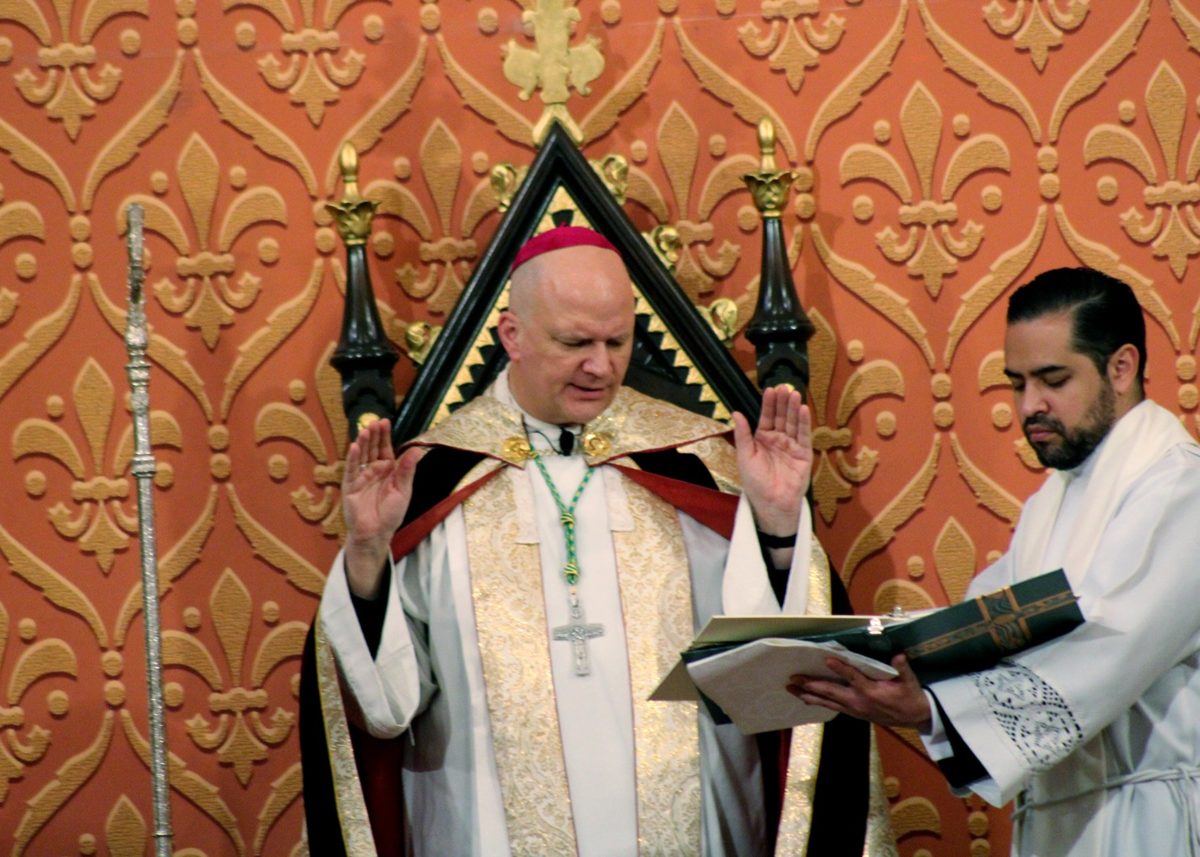By Tony Gutiérrez, Catholic News Service
TUCSON, Ariz. (CNS) — As Father Eusebio Kino was riding his horse through what is now Arizona and Sonora, Mexico, he was known to sing the “O Lux Beata” hymn and recite the Litany of Loreto.
Inspired by this, Carlos Zapién composed music to accompany these traditional hymns and prayers to premiere during a solemn vespers service commemorating the Jesuit missionary’s death 311 years ago.
“As humans, we are attracted to sound, and the sacredness of this composition invites us to reflect,” said Zapién. “Knowing the background of why we are singing ‘O Lux Beata,’ then this will invite people to learn more about what Father Kino did in our area.”
Bishop Edward J. Weisenburger of Tucson presided and preached at the prayer service March 20 at St. Augustine Cathedral.
It was the first opportunity to publicly commemorate the March 15, 1711, death of the Jesuit priest and candidate for sainthood since he was declared “Venerable” by Pope Francis July 11, 2020, during the COVID-19 pandemic. “Venerable” is a declaration of a person’s heroic virtues.
Known as the “Padre on Horseback” and referred to as “Padre Kino,” he brought Christianity to Upper Pimería, a region encompassing parts of what are today southern Arizona in the United States and northern Sonora in Mexico.
The priest also introduced, among other things, ranching and some new agricultural methods to the area.
Born in Segno near Trent, Italy, Padre Kino became a Jesuit priest in 1677 and was sent to New Spain. His body is entombed in present-day Magdalena de Kino in Sonora, Mexico.
“I like the image of the athlete running the race, and it’s immediately applicable not only to the Venerable Padre Kino and the way he denied himself in order to ‘run the race’ of his great mission to the Upper Pimería, but also in what sometimes appears to have been his relentless race across a territory so vast and extensive that few had ever traversed it as he did,” Bishop Weisenburger said in his homily.
He referenced a quote taken from the evening’s reading from St. Paul’s First Letter to the Corinthians: “Like the wisest of all athletes, he had his eye on the prize, and it is our belief that the prize is now indeed his.”
The bishop also compared Padre Kino’s mission to that of the Old Testament figure of Melchizedek, the mysterious priest-king, in Psalm 110, the first reading of the prayer service.
“I found myself wondering one day in prayer, what would it have been like for the local peoples of the Upper Pimería to have this mysterious holy man, this priest, emerge from their own wilderness — arriving from a far distant and mysterious place — and speaking to them of a God who had always been theirs — long before they even heard of him,” he reflected.
“A priest who didn’t begin his preaching with the fact that they were ‘lost’ and needed to be found — because in truth, they weren’t — but rather, that even without yet knowing it, they were loved and embraced and treasured by this God he preached — a God of compassion and mercy,” Bishop Weisenburger said. “A God who actually loved them no less than this mysterious God loved the people who had sent this Padre Kino to them.”
Prior to the evening prayer service, the Knights of Columbus Arizona State Council hosted a luncheon at the Tucson diocesan chancery office adjacent to the cathedral.
“Our vocation as Knights is to support our church and help men become stronger Catholics, better fathers, better husbands,” said the Knights’ state advocate, Lawrence Powers, in an interview. “Father Kino showed that. Most of us are going to fall short, but we look to people like Padre Kino to give us the example on how we should be living our lives today.”
During the luncheon, state Sen. Sally Ann Gonzales — a member of the Pascua Yaqui Tribe, one of the tribes Padre Kino served during his lifetime — presented Bishop Weisenburger with a lapel pin of the tribe’s seal.
“Father Kino is well-respected in the Indigenous community because of the dignity that he gave the people as he did his work here,” said Gonzales.
Her legislative district includes northwest Pima County, covering parts of Tucson and the Pascua Yaqui Reservation. Gonzales attends Cristo Rey Church on the reservation, a mission of St. Kateri Tekakwitha Parish in Tucson.
The Kino Heritage Society, whose mission is to promote Padre Kino’s canonization cause in the United States and educate people about his legacy, organized the event.
Society president Rosie Garcia said the group is planning to celebrate his Aug. 10 birthday, hold a symposium in November and later this year mark the 55th anniversary of the statue of Padre Kino being place across from the Arizona Capitol in Phoenix.
A statue of Padre Kino also represents Arizona in the National Statuary Hall Collection at the U.S. Capitol in Washington.
“We hope that with time, people will learn to recognize that Padre Kino is a man for all seasons, for all times,” said Garcia. “He doesn’t have to be back in the 18th century. He’s here with us. He’s still very much alive.”







